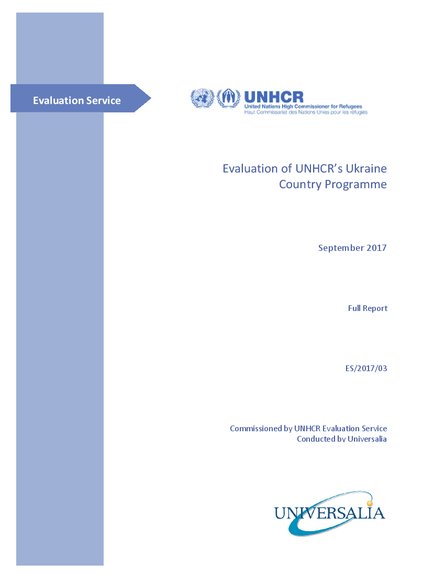
This evaluation report provides an assessment of UNHCR’s operations in Ukraine between January 2014 and December 2016, reviewing its dual roles as an operational agency and as coordinator of the Shelter/Non‐Food Item (NFI) and Protection Clusters. It considers the relevance and appropriateness of UNHCR’s objectives and strategy, examines how the evolving policy and operational context influenced decisions with respect to UNHCR’s positioning and programme delivery arrangements, and assesses the results achieved by UNHCR in the context of the inter‐agency response to the Internally Displaced Person (IDP) situation. The evaluation is expected to be used for both accountability and learning.
Methodology: The evaluation was guided by OECD‐DAC Evaluation Quality Standards for Development Evaluation, the UNEG Norms and Standards for Evaluation in the UN System, the UNEG Ethical Guidelines and Code of Conduct for Evaluation in the UN System, UNHCR’s recently‐published Evaluation Policy and accompanying guidance on Evaluation Quality Assurance, and the Sphere Handbook and Standards for Monitoring and Evaluation. The overall approach to the evaluation was utilization‐focused and applied mixed methods. The evaluation had six main data sources, which included: a document review of over 600 documents, semi‐structured interviews with 112 stakeholders both face‐to‐face and via phone or videoconference, an online survey to current and former UNHCR personnel and partner agency staff, field observations in the Government Controlled Areas (GCAs), structured focus groups with refugees and IDPs, and an analysis of available databases and reporting systems. The evaluation team was not able to visit Non‐Government Controlled Areas (NGCAs) for security reasons and experienced some limitations with regards to assessing the results of the Ukraine operation due to the planning and reporting information available in the Country Operational Plans (COPs).